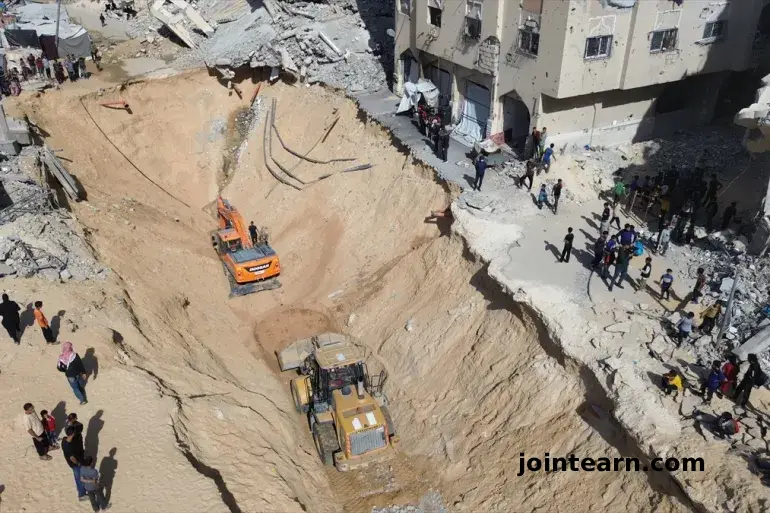
In a renewed exchange under the ongoing Gaza ceasefire agreement, Israel and Hamas have returned more bodies of captives, even as tensions rise over Israel’s continued refusal to reopen the Rafah border crossing with Egypt — a key clause in the truce deal.
Bodies of Two Israeli Captives Returned
Late Tuesday, the bodies of two Israeli captives — identified as Aryeh Zalmanovich, 85, and Master Sergeant Tamir Adar, 38 — were handed over to Israel. According to the Israeli military, Zalmanovich died in captivity in Gaza in November 2023, while Adar was killed during Hamas’s October 7, 2023 attacks in southern Israel, with his body taken into Gaza.
The exchange was facilitated by the International Committee of the Red Cross (ICRC) and coordinated with Hamas’s Qassam Brigades, the group’s armed wing.
To date, Hamas has returned the remains of 15 Israeli captives as part of the ceasefire deal. However, the Palestinian group says recovery efforts have been hampered by massive destruction in Gaza and Israeli forces maintaining control over several areas.
“The widespread devastation and ongoing Israeli occupation of parts of Gaza are making it difficult to recover more bodies,” a Hamas official said.
Israel expects another 13 sets of remains to be returned in the coming days.
Palestinian Bodies Also Returned
Earlier Tuesday, 15 Palestinian detainees who died in Israeli custody were returned to Gaza. The remains were transported to the Nasser Medical Complex for identification. Under the terms of the ceasefire, Israel agreed to release 2,000 living Palestinian detainees and 360 deceased Palestinians held in Israeli prisons.
A forensics team that examined 45 bodies returned last week reported visible signs of abuse, with some victims still shackled or showing indications of execution.
“This entire system dehumanises Palestinians,” said Ubai Al-Aboudi, executive director of the Bisan Center for Research and Development in Ramallah. “When we talk about Palestinian prisoners, we are actually talking about hostages.”
Al-Aboudi noted that nearly 20 percent of the Palestinian population has been arrested or detained by Israel since 1967, often without formal charges or due process.
Hamas Accuses Israel of Violating Ceasefire
Despite the prisoner exchanges, Hamas officials accused Israel of deliberately delaying the implementation of the ceasefire deal by keeping the Rafah crossing closed and blocking humanitarian aid.
In a statement from Doha, where Hamas representatives met with Turkish officials, delegation head Mujahid Muhammad Darwish reaffirmed the group’s commitment to the truce.
“Israel continues to violate the ceasefire by preventing medical evacuations and humanitarian access through the Rafah crossing,” Darwish said. “Our people have an inalienable right to self-determination and to an independent state with Jerusalem as its capital.”
Rafah Crossing Remains Closed Despite International Pressure
The Rafah border crossing, which links Gaza to Egypt, has remained closed since May 7, 2024, when Israeli forces seized control during their offensive on Rafah — then sheltering nearly one million displaced Palestinians.
The United Nations describes Rafah as one of Gaza’s two vital “humanitarian arteries.” In May 2024, the International Court of Justice (ICJ) ordered Israel to reopen the crossing following an emergency appeal by South Africa, but the directive has been largely ignored.
Rafah briefly reopened during a temporary truce in January 2025, allowing medical evacuations in February. However, by late March, Israel reimposed evacuation orders and sealed the crossing again, citing “security concerns.”
Since May 2024, aid deliveries have been rerouted through Karem Abu Salem (Kerem Shalom) crossing, but humanitarian organizations warn that limited access has led to critical shortages of food, medicine, and fuel.
International Reactions and Humanitarian Concerns
Turkiye, which co-signed the US President Donald Trump-brokered ceasefire document in Sharm el-Sheikh, Egypt, has called for both sides to fully comply with the agreement. Turkish diplomats in Doha reaffirmed their readiness to mediate between Israel and Hamas to prevent a collapse of the truce.
Meanwhile, UN officials continue to warn that the prolonged closure of Rafah and the slow pace of prisoner and body exchanges are threatening fragile humanitarian progress in Gaza.
According to the World Health Organization (WHO), hundreds of injured Gazans remain stranded without access to lifesaving medical care in Egypt or Jordan.
A Fragile Truce Under Pressure
The ceasefire, implemented earlier this month, was intended to end a conflict that began with Hamas’s attacks on Israel in October 2023 and resulted in tens of thousands of deaths and widespread devastation across Gaza.
While both sides have carried out parts of the agreement — including prisoner exchanges and partial withdrawals — disputes over border control, aid access, and accountability threaten to unravel the fragile truce.
With Hamas accusing Israel of violations and Israel insisting on security guarantees before reopening crossings, the path toward a lasting peace remains uncertain.


Leave a Reply